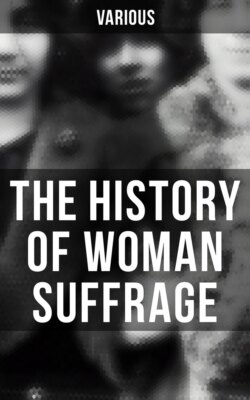Читать книгу The History of Woman Suffrage - Various - Страница 67
На сайте Литреса книга снята с продажи.
FOOTNOTES:
Оглавление76. The New York Tribune, Feb. 19, 1881, gives the following interesting facts: "William Franklin, the illegitimate son of Benjamin, who was long a resident of New York and hereabout, conducted in person his father's postal system. At Amboy, or Perth Amboy, a little town of once high aristocratic standing, which dozes on the edge of the Jersey hills and overlooks the oyster groves of Prince's Bay, began the Post-Office of North America under John Hamilton in 1694. It was a private patent, and he sold it to the Government. Many years afterward William Franklin settled at the same place, where once his father passed in Hamilton's day a footsore vagrant pressing from Boston to Philadelphia to get bread. There the younger Franklin reared a 'palace,' and lived in it as Governor of New Jersey till his adherence to the Crown, that had done better for him than his father—made him an exile and a captive. He was sent under guard to East Windsor, Conn., and his jail was made in the house of Captain Ebenezer Grant there, of the family of President Grant's ancestors, and he was prohibited the use of pen, ink, and paper—a needless punishment to a man who had delivered so many letters to others."
77. In the New York Observer, 1876.
78. After a diligent search for Mr. James Ross and his promised "interesting chapter of local history," we learned that the author was in his grave, and that from his posthumous papers this valuable document had not yet been exhumed by his literary executor.
79. The following letter contains the sentiments referred to in the text:
Orange, N. J., Dec. 18, 1858.
Mr. Mandeville, Tax Collector, Sir:—Enclosed I return my tax bill, without paying it. My reason for doing so is, that women suffer taxation, and yet have no representation, which is not only unjust to one-half the adult population, but is contrary to our theory of government. For years some women have been paying their taxes under protest, but still taxes are imposed, and representation is not granted. The only course now left us is to refuse to pay the tax. We know well what the immediate result of this refusal must be.
But we believe that when the attention of men is called to the wide difference between their theory of government and its practice, in this particular, they can not fail to see the mistake they now make, by imposing taxes on women, while they refuse them the right of suffrage, and that the sense of justice which is in all good men, will lead them to correct it. Then we shall cheerfully pay our taxes—not till then.
Lucy Stone.
Respectfully,
80. See Washington National Intelligencer for Oct. 15, 1857, and Historical Magazine, Vol. I., page 360.
81. Frank Leslie's Magazine, Feb., 1877.
